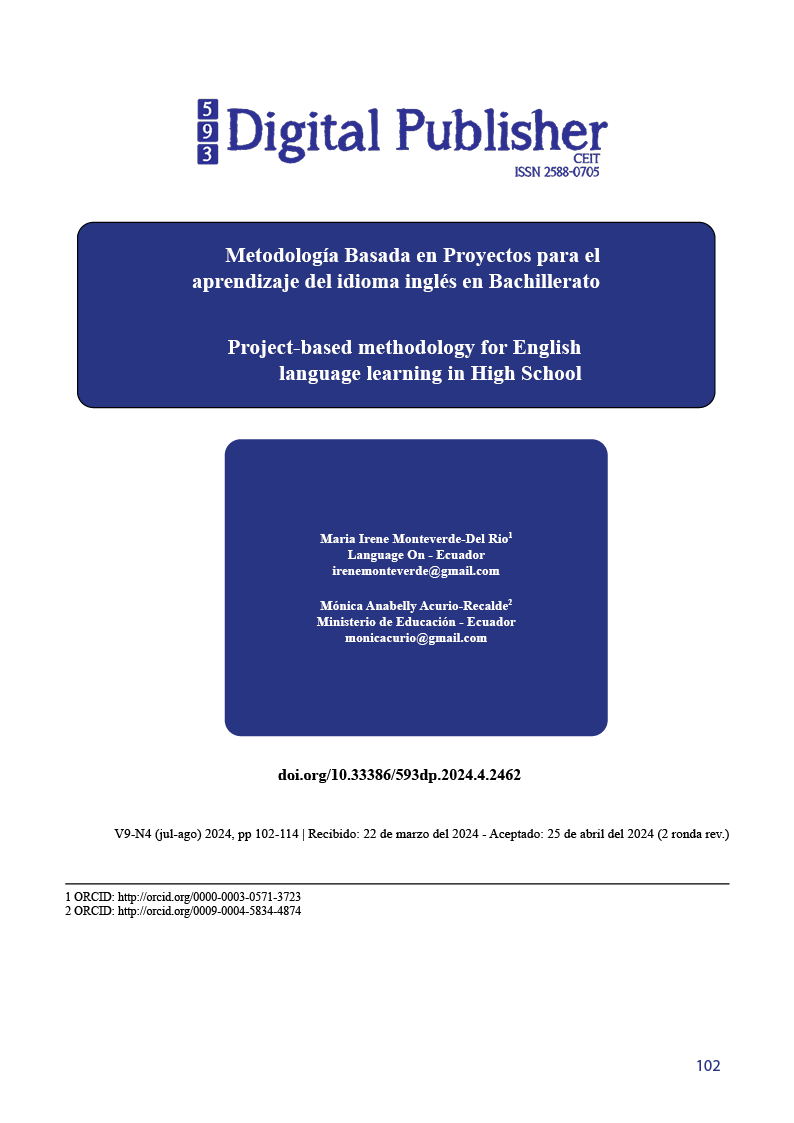Project-based methodology for English language learning in High School
Main Article Content
Abstract
High School students in Ecuador's Fiscal Educational Units have not developed skills in the English foreign language, nor can they recognize environmental problems and contribute with an effective and efficient solutions to them. The application of active communication methodologies such as project-based learning can help solve the problem together with the use of technology, thus contributing to the practice of oral skills to present innovative proposals for a specific project that can be sustainable over time. It is evident the lack of active methodological practices in the country's fiscal institutions, added to the little control in the educational establishments of the application of this type of tools that promote teamwork, hinders the improvement of the quality of education, especially in the subject of English. It is necessary to follow up on the teaching performance and the application of this methodology to generate new challenges in the educational area, especially in high school students, and complete their exit profile successfully in the English language. An article template and instructions on the editorial process and the text, figure, and references format are provided.
The approach of this study is qualitative with a descriptive scope of the content for which the previous bibliography on the proposed topic is used, making a review of the literature on the project-based methodology (MBP) and its influence on the development of oral communication in the English language in the students.
Downloads
Article Details

This work is licensed under a Creative Commons Attribution-NonCommercial-ShareAlike 4.0 International License.
1. Derechos de autor
Las obras que se publican en 593 Digital Publisher CEIT están sujetas a los siguientes términos:
1.1. 593 Digital Publisher CEIT, conserva los derechos patrimoniales (copyright) de las obras publicadas, favorece y permite la reutilización de las mismas bajo la licencia Licencia Creative Commons 4.0 de Reconocimiento-NoComercial-CompartirIgual 4.0, por lo cual se pueden copiar, usar, difundir, transmitir y exponer públicamente, siempre que:
1.1.a. Se cite la autoría y fuente original de su publicación (revista, editorial, URL).
1.1.b. No se usen para fines comerciales u onerosos.
1.1.c. Se mencione la existencia y especificaciones de esta licencia de uso.
References
Sellán Cusme , E., & Macías Loor, M. (2023). Project-Based Learning y su aporte en el mejoramiento de la Producción Oral del Inglés. Obtenido de: file:///C:/Users/irene/Downloads/art.+8.pdf.
Andrade Escobar, A., Juarez Romero, M., Francisco, G., Luz Maria, P., & Laura, V. (2010). Manual Técnicas e instrumentos para facilitar la Evaluacion del Aprendizaje. https://educrea.cl/wp-content/uploads/2018/08/Manual-tecnicas-instrumentos-para-la-evaluacion.pdf.
Artime Contreras, G., Morales Vazquez, E., & Silvan Almeida, R. (2023). El estado del inglés como L2 en México durante los últimos años. Obtenido de: https://ciencialatina.org/index.php/cienciala/article/view/6971.
Beltran, M. (2017). El aprendizaje del idioma inglés como lengua extranjera. Obtenido de: https://revista.redipe.org/index.php/1/article/view/227.
Bonilla Lucero, M. T., & Morocho Quintuña, A. R. (2021). Aprendizaje significativo basado en el método de proyectos, dirigido a los/ las estudiantes del segundo de Bachillerato Técnico del área de Emprendimiento y Gestión de la Unidad Educativa Indanza. Retrieved from http://201.159.222.12/handle/56000/1718
Cascales-Martínez, A., Pamires Berenguer, M., & Gomariz Vicente, M. (2023). Estado de los factores condicionantes de la transferencia de la formación permanente en etapas educativas no universitarias. Retrieved from file:///C:/Users/irene/Downloads/520061-Texto%20del%20art%C3%ADculo-2132761-1-10-20230707.pdf
Causil Vargas, L. A., & Rodríguez de la Barrera, A. E. (2021). Aprendizaje Basado en Proyectos (ABP). Retrieved from https://dialnet.unirioja.es/servlet/articulo?codigo=7911728
Diario El Comercio. (2021). Ecuador mantiene un bajo nivel de dominio del idioma inglés. https://www.elcomercio.com/tendencias/sociedad/ecuador-idioma-dominio-ingles-estudiantes.html.
Garcés Delgado,, Y., Santana Veg, L. E., & Feliciano García, L. (2020). Proyectos de vida en adolescentes en riesgo de exclusión social. Retrieved from https://revistas.um.es/rie/article/view/332231/276901
Garcia Lara, R. (2023). Formación continua en el fortalecimiento del desempeño docente en un instituto público de Santo Domingo. Obtenido de: https://repositorio.ucv.edu.pe/handle/20.500.12692/107451.
Garcia Mesa, J. (2023). Funciones comunicativas en idioma inglés para el desarrollo de habilidades orales. Obtenido de: https://rescalpelo.sld.cu/index.php/scalpelo/article/view/181.
García Parrales, Z. (2022). Aprendizaje basado en proyecto como estrategia metodológica en la asignatura de Emprendimiento. Retrieved from http://repositorio.unesum.edu.ec/bitstream/53000/5145/1/Garc%C3%ADa%20Parrales%20Zeida%20Elizabeth.pdf
Guayanlema Chávez, I., Castillo Llamuca, D., Illicachi Rojas, G., & Quishpi Espinel, L. (2023). Metodologías activas para el aprendizaje del idioma inglés en la educación superior. Obtenido de: https://dominiodelasciencias.com/ojs/index.php/es/article/view/3607.
MCER. (2002). Marco Comun Europeo de Referencia para las lenguas. Obtenido de: https://rm.coe.int/marco-comun-europeo-de-referencia-para-las-lenguas-aprendizaje-ensenan/1680a52d53.
Mineduc. (2023). Estadistica Educativa Volumen 4.
Mullo Romero, E. d., & Vera Peña, V. M. (2019). El desarrollo del turismo comunitario en ecuador: reflexiones necesarias. Retrieved from http://scielo.sld.cu/scielo.php?script=sci_arttext&pid=S2218-36202019000200178#aff1
Primicias. (2019). Ecuador tiene el peor nivel de inglés de América Latina. https://www.primicias.ec/noticias/sociedad/idioma-ingles-estudiantes-convenio-educacion-profesores/.
Reyes Vargas, M., Ortega Ocaña, A., & Machado Chaviano, E. (2018). MODELO PARA LA GESTIÓN INTEGRADA DEL TURISMO. Retrieved from https://www.redalyc.org/pdf/367/36750475010.pdf
Rivera Zambrano, A., Zambrano Mendoza, G., Andino Pilco, J., Pilco Lopez, M., & Gavin Quishpe, R. (2023). Estrategia metodológica basada en la inteligencia lingüística para mejorar el nivel de la comunicación. Obtenido de: https://dominiodelasciencias.com/ojs/index.php/es/article/view/3449.
Robledo Sánchez, D. (2023). Teoría de las Inteligencias Múltiples: Una estrategia para Retroalimentar y apoyar el Rendimiento Académico en Contextos Rurales. . Retrieved from https://ciencialatina.org/index.php/cienciala/article/view/5731
Saldarriaga-Zambrano, P., Bravo-Cedeño, G., & R. LoorRivadeneira, M. (2016). La teoría constructivista de Jean Piaget y su significación para la pedagogía. Retrieved from file:///C:/Users/irene/Downloads/Dialnet-LaTeoriaConstructivistaDeJeanPiagetYSuSignificacio-5802932%20(1).pdf



